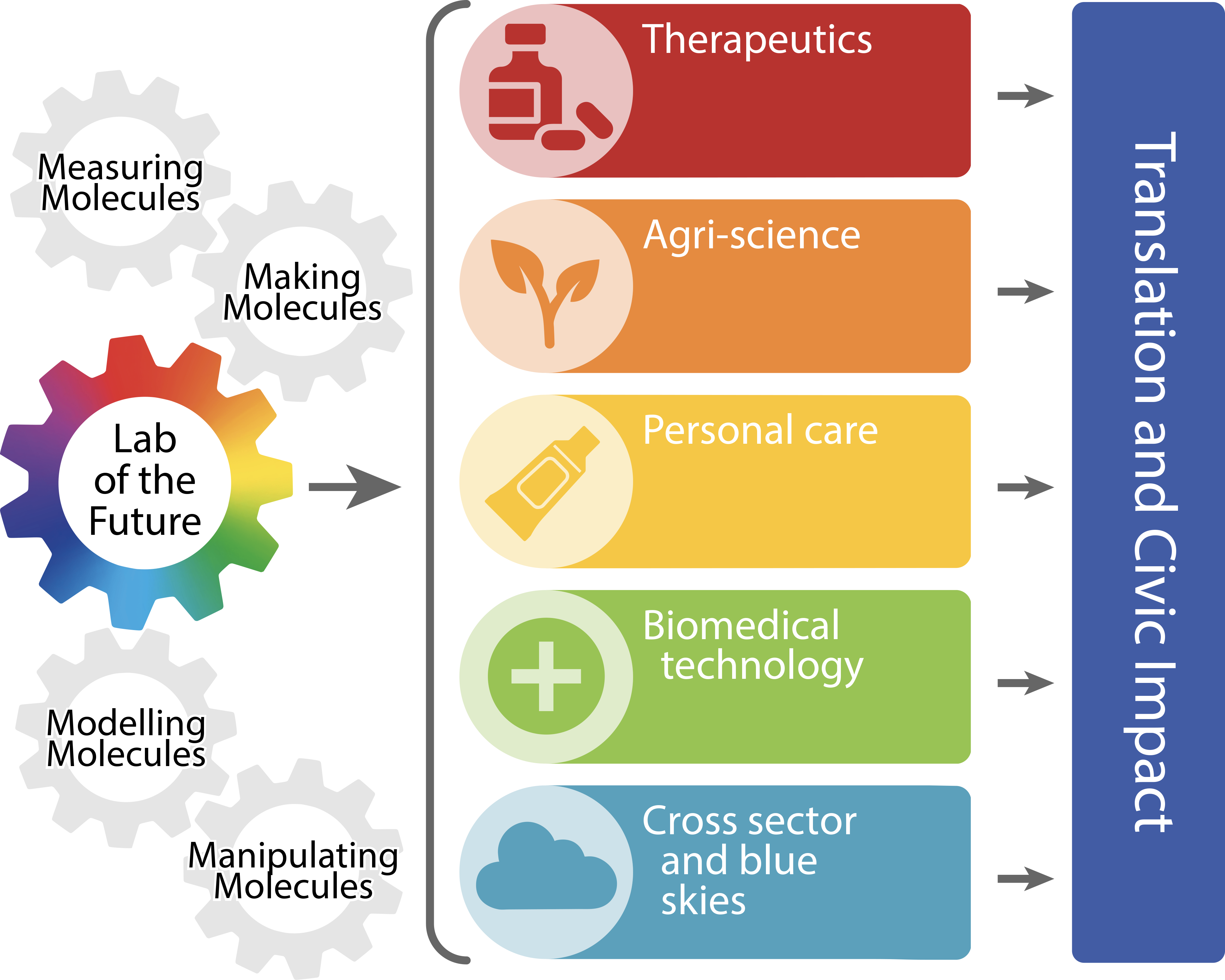The Institute of Chemical Biology (ICB) was created more than 20 years ago with a focus on the development of novel molecular tools and technologies to tackle challenges in the drug-discovery, healthcare, and over the years has expanded its focus to include the agri-science and personal care sectors. It brings together more than 165 research groups across Imperial College London with over 45 strategic civic and industrial partnerships along with an SME business club.
Support for multidisciplinary postgraduate and postdoctoral training is one of the most important priorities of the Institute. Our pioneering EPSRC Centre for Doctoral Training (CDT) was renewed for its fifth iteration in March 2024: The EPSRC Centre for Doctoral Training in Chemical Biology: Empowering UK BioTech Innovation. Indeed, the ICB CDT is the longest running CDT in the UK and has graduated >380 PhD students to date and we are very proud of the fact that more than 90% of our graduates remain in science. The ICB CDT forms the heart of the ICB at Imperial .

The mission of the ICB CDT is to train postgraduate researchers with the language, knowledge and skills to enable them to work at the interface between the physical and life sciences, producing researchers with expertise and understanding that spans both fields, and who are able to embrace Lab of the Future platforms – which is at the heart of our new remit. This skill set is in great demand from future employers and short supply and has the potential to revolutionise the state of the art with respect to manipulating, measuring and modelling molecular interactions in biological systems and will transform R&D pipelines.
This will transform our understanding of molecular mechanisms of disease, stimulate novel agrochemical design and underpin structured product breakthroughs, whilst also enabling fundamental discovery in the life and medical sciences.
Our programme, with EDI, student empowerment & cohort formation at its core, fuses blue skies & translational research with professional skills courses and workplace training. Students emerge with a knowledge of molecular technologies, sustainable product development, lean innovation & early-stage commercialisation. Our multi-disciplinary supervision model, with every student in the CDT having at least two supervisors, one from the physical sciences and one from the life sciences, comprises 1-year MRes + 3-year PhD, with for the first time an optional 1 year post doctoral fellowship, called Elevate, that will offer graduates unparalleled in-work experience.
The ICB CDT cohorts are supported by and benefit from one of the world’s largest Chemical Biology communities. The ICB CDT offers unparalleled depth & breadth bringing together the ICB academic community with Industry CDT partners, who are leaders in pharma, personal care, agri-science, and bio/med tech as well as SMEs, government agencies/facilities and affiliates.
MRes
Students will join the first year for a multidisciplinary MRes in Chemical Biology & Bioentrepreneurship, where exciting professional and transferable skills courses are crafted and delivered in partnership with industry, and fused with world class research, hacking and entrepreneurship training.
This includes: a 9-month multidisciplinary research project; taught courses; FutureLab, where students will get experience of prototyping and industry 4.0 training in Imperial College’s Advanced Hackspace; Imperial's industry-led innovation workshops; a high-throughput Drug Screening Programme run in our new automated facility; and much more.
Read more about our MRes training here.
PhD
The one-year MRes is followed by a 3-year PhD building on the research project from the MRes.
During this phase of the programme students continue to benefit from additional bespoke transferable skills training courses in Science Communication, outreach and responsible research innovation alongside our EVOLVE programme, delivering student-tailored career boosting placements.
In addition, through the InnovaLab programme students will have the opportunity to create their own start-ups. Over the years many of our students have filed their own patents and created their own successful spin-out companies, e.g. FA Bio, Fresh Check, anywhereHPLC.
Read more about our PhD Training Programme here.
ELEVATE Fellowship Programme
Graduates selected for this optional programme will benefit from a 2-month work-focused module including leadership training followed by 10 month in-work SP placements.
Following their PhD, graduates can apply for the ELEVATE Postdoctoral Fellowship, which will build on the skills and experience developed in their PhD.
Fellows will benefit from a 2-month skills module in a cohort environment including Design Thinking, Impact, Business Communication, and Leadership. This will be followed by in-work placements over 10 months with our strategic partners.
During each ELEVATE cycle, placements with our strategic partners (2-10 months) will be offered. This will give the postgraduates experience across all sectors linked to the CDT.
Apply


